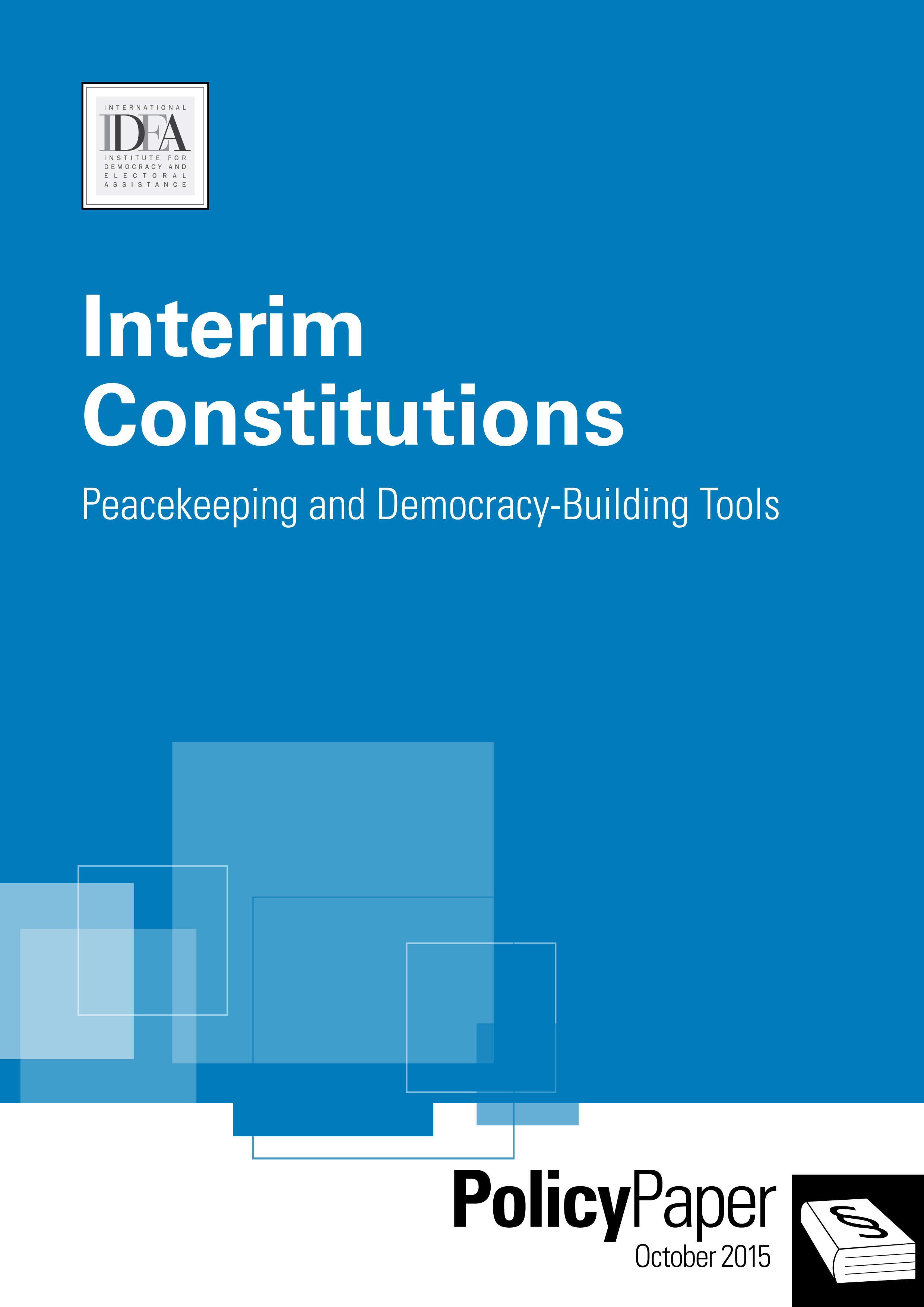Interim Constitutions: Peacekeeping and Democracy-Building Tools

ဤ မူဝါဒစာတမ်းသည် ပဋိပက္ခဒဏ်ခံရသောနိုင်ငံများရှိ ကြားဖြတ်ဖွဲ့စည်းပုံအခြေခံဥပဒေများ၏ ပုံစံ၊ လုပ်ငန်းစဉ်တို့နှင့်ပတ်သတ်၍ ရေးသားထားသော ပညာရပ်ဆိုင်ရာစာပေများနှင့် မူဝါဒများအကြား သိသာထင်ရှားသည့်ကွာဟချက်ကို ဖြည့်ဆည်းရန် ရည်ရွယ်ပါသည်။
ကြားဖြတ်ဖွဲ့စည်းပုံအခြေခံဥပဒေသည် ငြိမ်းချမ်းရေးသဘောတူညီမှု၊ ကြားဖြတ်အစီအမံတို့နှင့် မတူသည့်အချက်မှာ ၎င်း၏အားသာချက်သည် တရားဥပဒေအရ အာဏာတည်ရှိမှုဖြစ်ကြောင်း ဤစာတမ်းတွင် အခိုင်အမာဆိုထားပါသည်။ ၁၉၉၀ ခုနှစ်အလွန်ကာလရှိ ကြားဖြတ်ဖွဲ့စည်းပုံအခြေခံဥပဒေများ၏ ရေးဆွဲဖွဲ့စည်းပုံနှင့် ကျယ်ပြန့်သောငြိမ်းချမ်းရေးတည်ဆောက်ခြင်း လုပ်ငန်းစဉ်များ မတူကွဲပြားမှုကို အဓိကထား လေ့လာဆန်းစစ်ထားပါသည်။
ဤစာတမ်း၏ အဓိကသုံးသပ်ချက်အနက် တစ်ခုမှာ နိုင်ငံအခြေအနေ၊ ရွေးချယ်သောလုပ်ငန်းစဉ်နှင့် ပုံစံအကြား ဆက်စပ်မှုတို့သည် နိုင်ငံအလိုက်ကွဲပြားမှုများရှိသော်ငြားလည်း အများသဘောတူညီလက်ခံမှုရရှိစေရန် ကြားဖြတ်ဖွဲ့စည်းပုံအခြေခံဥပဒေများသည် အချိန် သို့မဟုတ် အခွင့်အလမ်းကို ပေးအပ်ခြင်းဖြင့် အထောက်အကူပြုနိုင်စွမ်းရှိပါသည်။ ကြားဖြတ်ဖွဲ့စည်းပုံအခြေခံဥပဒေများသည် အများပါဝင်မှုရှိသော ဖွဲ့စည်းပုံအခြေခံဥပဒေစနစ် ယဉ်ကျေးမှုတစ်ခုဖြစ်ပေါ်လာစေရန် အထောက်အပံ့ပေးခြင်း၊ ရွေးကောက်ပွဲကျင်းပရေးနှင့်ပတ်သတ်၍ ရှေ့နောက်အစီအစဉ်သတ်မှတ်ခြင်းဆိုင်ရာ ကိစ္စရပ်များကိုဖြေရှင်းခြင်းနှင့် ဖွဲ့စည်းပုံအခြေခံဥပဒေမူဘောင်များ အကောင်အထည်ဖော်ရန် အဓိကအဖွဲ့အစည်းများကို အားကောင်းခိုင်မာစေခြင်းတို့ကို ဆောက်ရွက်ပေးနိုင်သည့် အလားအလာရှိပါသည်။
This Policy Paper aims to fill a significant gap in the policy and academic literature on the process and design of interim constitutions in conflict-affected settings.
It argues that, unlike both peace agreements and interim arrangements, the strength of interim constitutions lies in their legal enforceability. It examines the diversity of post-1990 interim constitutions in terms of their structure and their role in broader peacebuilding processes.
One of its main conclusions is that, despite key differences that also relate to the relationship between the country context and the choice of procedure and design, interim constitutions potentially offer time or the opportunity to facilitate consensus over time. They also have the potential to contribute to a culture of participatory constitutionalism, and address sequencing issues around elections and the strengthening of key institutions responsible for implementing constitutional frameworks.